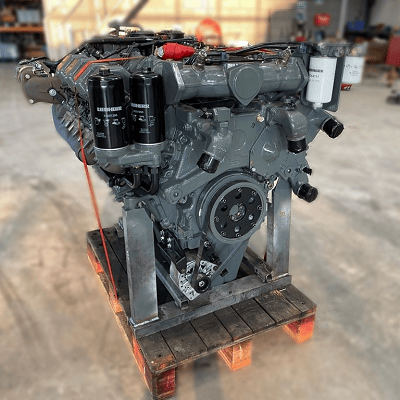The process of a dyno test on a Liebherr engine

When it comes to heavy machinery, reliability and power are paramount. Liebherr, a name synonymous with innovation and excellence in engineering, stands tall as a pioneer in the realm of heavy equipment and machinery. From towering cranes to robust excavators, Liebherr’s engineering prowess extends to the heart of these machines. We delve into the world of dyno testing a Liebherr engine, uncovering the meticulous process behind unleashing the raw power concealed within.
The foundation of excellence
Before we embark on the journey of dyno testing, it’s crucial to understand the foundation upon which Liebherr engines are built. With decades of engineering expertise and commitment to quality, Liebherr engines are crafted to withstand the most demanding environment and deliver unparalleled performance. Each component is meticulously designed and rigorously tested to ensure reliability, efficiency and longevity.
The process
1 Preparation: The engine undergoes meticulous preparation before being mounted onto the dynamo meter. This includes ensuring all connections are secure, fluids are filled to the appropriate levels, and sensors are properly calibrated.
2 Mounting: The engine is carefully mounted onto the dynamometer, a specialized device designed to simulate real-world operating conditions. Precision is paramount during this step to ensure accurate results.
3 Initial checks: Once mounted, a series of initial checks are conducted to verify proper alignment, connection integrity, and functionality of all engine systems.
4 Warm-up: The engine is started and allowed to warm up to operating temperature. This ensures consistent results and minimizes the risk of damage during testing.
5 Baseline testing: With the engine warmed up , baseline tests are conducted to establish initial performance metrics. This includes measuring power output, torque, fuel consumption, and emissions at various RPM levels.
6 Load testing: The engine is subjected to progressively increasing loads to simulate different operating conditions, such as idle, partial load and full load. This allows engineers to assess performance across the entire operating range and identify any potential issues or optimization.
7 Data analysis: Throughout the testing process, data is continuously collected and analyzed in real-time. Advanced instrumentation and software are used to monitor performance metrics and identify trends or anomalies.
8 Optimazation: Based on the data analysis, adjustments may be made to optimize engine performance. This could involve fine-tuning fuel injection timing, adjusting air-fuel ratios, or optimize turbocharger boost pressure.
9 Validation: Once testing is complete, the results are meticulously reviewed and validated against predetermined criteria and specifications. Any deviations or anomalies are thoroughly investigated to ensure accuracy and reliability.
10 Reporting: Finally, a comprehensive report is generated detailing the results of the dyno testing, including performance metrics, observations, and any recommendations for further optimization or refinement.
The outcome of dyno testing
Dyno testing a Liebherr engine is more than just a routine procedure – it’s a testament to the unwavering commitment to excellence that defines Liebherr’s engineering philosophy. By subjecting their engines to rigorous testing and analysis, Liebherr ensures that each engine delivers the uncompromising performance, reliability, and efficiency that customers expect.
In conclusion, dyno testing a Liebherr engine is not just about measuring power output. It’s about unlocking the true potential of these remarkable engines and ensuring they exceed expectations in the most challenging environments imaginable.
Curing agents, also known as hardeners, are essential components of many polymer systems, including Epoxy Resins. Curing agents react with the epoxy resin to form a three-dimensional crosslinked network, resulting in a cured polymer with improved mechanical properties, chemical resistance, and thermal stability.
There are several types of curing agents, each with its own unique properties and applications. The most common type is amine-based curing agents, which react with the epoxy functional group to form a secondary amine and an alcohol. This reaction is exothermic and can be accelerated by heat, making it ideal for high-temperature applications.
Another type of curing agent is anhydride-based, which react with the epoxy group to form a cyclic acid anhydride and a hydroxyl group. These curing agents are typically used in applications where water resistance is critical, such as marine coatings and adhesives.
Other types of curing agents include phenolic, acid, and catalytic curing agents. Phenolic curing agents are used in high-temperature applications, while acid curing agents are used in low-temperature applications. Catalytic curing agents are used to accelerate the curing process and are typically used in combination with other curing agents.
The choice of curing agent depends on the specific application requirements, such as cure time, cure temperature, and final properties of the cured polymer. It is important to choose the correct curing agent to ensure that the final product meets the desired specifications.
In summary, curing agents are essential components of many polymer systems, including epoxy resins, and play a critical role in improving the mechanical, chemical, and thermal properties of the cured polymer. The choice of curing agent depends on the specific application requirements and must be carefully considered to ensure the final product meets the desired specifications.
Curing Agent,Epoxy Curing Agent,Curing Agent Coating,Polyether Amines
Shanghai Shengduan Trading Co., Ltd. , https://www.shsdchem.com
